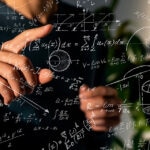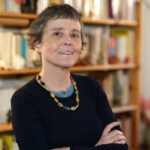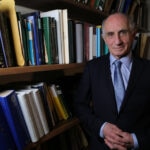Frontiers Award to Voisin and Eliashberg for breaking down barriers in geometry
The BBVA Foundation Frontiers of Knowledge Award in Basic Sciences has gone to Claire Voisin (National Centre for Scientific Research, CNRS, France) and Yakov Eliashberg (Stanford University, United States) for driving forward mathematical thought by bridging the space between two key areas of geometry with special relevance to quantum physics.

The award committee's citation notes that both researchers have made "outstanding contributions" to algebraic and symplectic geometry. These two areas of research have acquired special importance in recent years because of their potential to provide mathematical foundations for quantum field theory.
This branch of quantum physics, which is used to great success in the study of particle physics, is not entirely well defined mathematically. Therefore, a leading line of research is currently seeking to reconstruct quantum field theory from symplectic or algebraic geometry in order to explore whether the physical consequences deduced from these formulations agree with reality.
“For researchers in our discipline, there’s no greater stimulus than when you break down the barriers between two areas, because by doing that you can adopt a new language, possibly a new framework, a new way of looking at things from the other side, which enables you to make further progress. If you can frame something you have a problem about in another format, then sometimes you can see the way forward. This has been among the main contributions of Voisin and Eliashberg, who have furthered the progress of mathematics by dismantling the barriers between areas of geometry,” explains committee member Nigel Hitchin, Emeritus Savilian Professor of Geometry in the Mathematical Institute at the University of Oxford, and an award committee member.

Claire Voisin (National Centre for Scientific Research, CNRS, France).
Mathematics as a source of wisdom and mental discipline
Voisin admits that her research “has no direct application” in solving the practical problems of today. But then again, she adds, in mathematics “you never know what will be useful,” whether it be to inspire new advances in our basic knowledge of nature or to hasten technological development.
Whatever the case, Voisin sees mathematics as primarily “a fact of civilization,” with a cultural value comparable to that of music: “Doing mathematics,” she affirms, “is a source of knowledge, a way of attaining knowledge that is at the root of something fundamental in human activity.”
In today’s society, inundated with screens and saturated with instant messages that reach us via multiple channels, Voisin stakes a claim for mathematics as an essential mental discipline: “For me, it’s a form of concentration and I think many people today do not realize how important it is to know how to concentrate.”

Yakov Eliashberg (Stanford University, United States).
Application to future space missions
Eliashberg, meantime, talks of “the beauty of the new worlds created by mathematics,” frequently the product of a creative dialogue between people from different fields: “I believe that both in mathematics and science in general, the most wonderful results come from discovering the connections between seemingly different things.”
Like Voisin, he points up the fact that, as the history of science has repeatedly shown, “if you have a great mathematical idea, then it’s almost sure at some point to bring some kind of application that is useful to society.” Indeed his own research is being put to use in the design of future space missions: “Some of my colleagues are working with NASA to try to apply tools derived from my work in the optimization of spaceship or satellite trajectories, consuming as little fuel as possible and taking advantage of the gravitational pull of planets.”